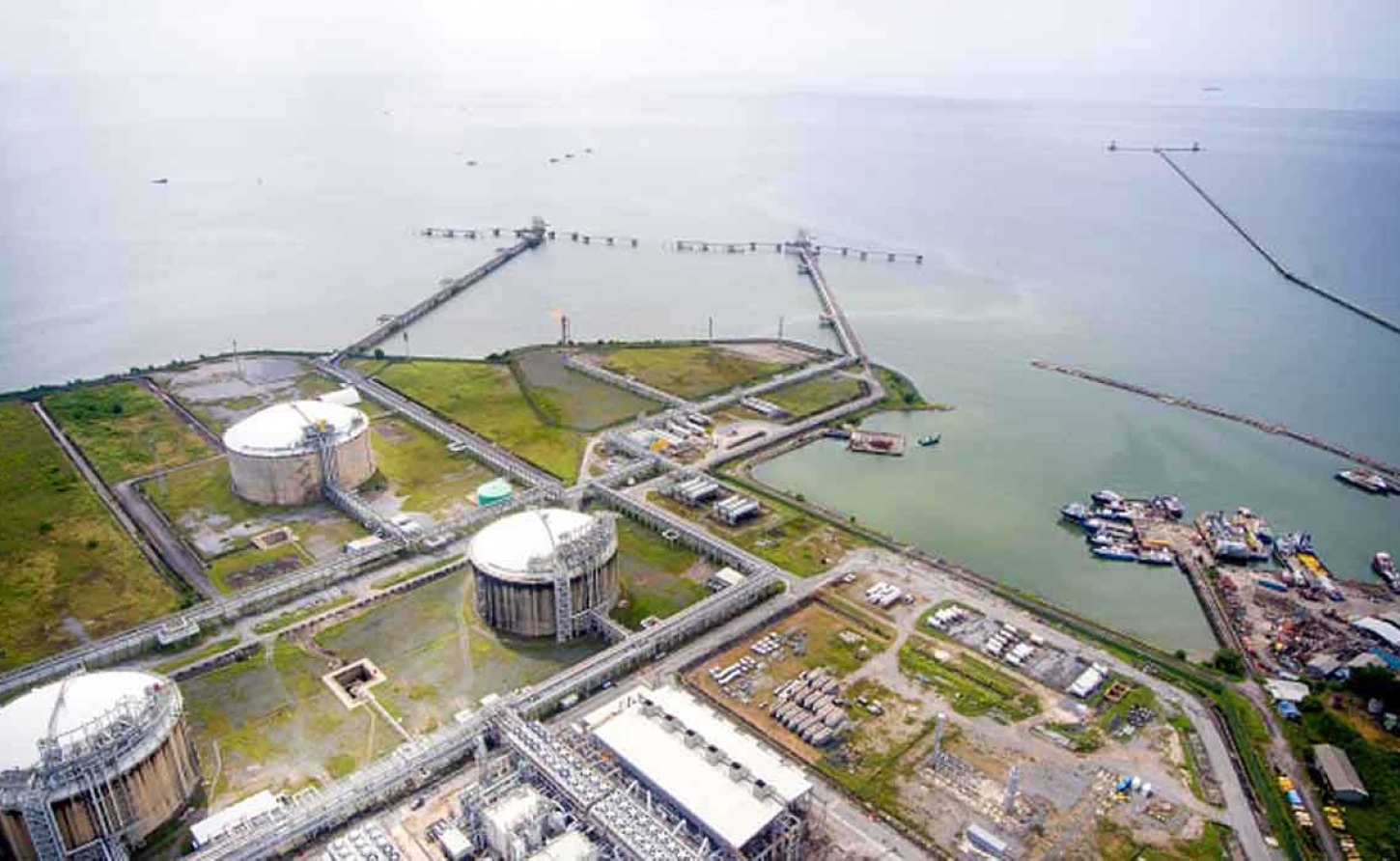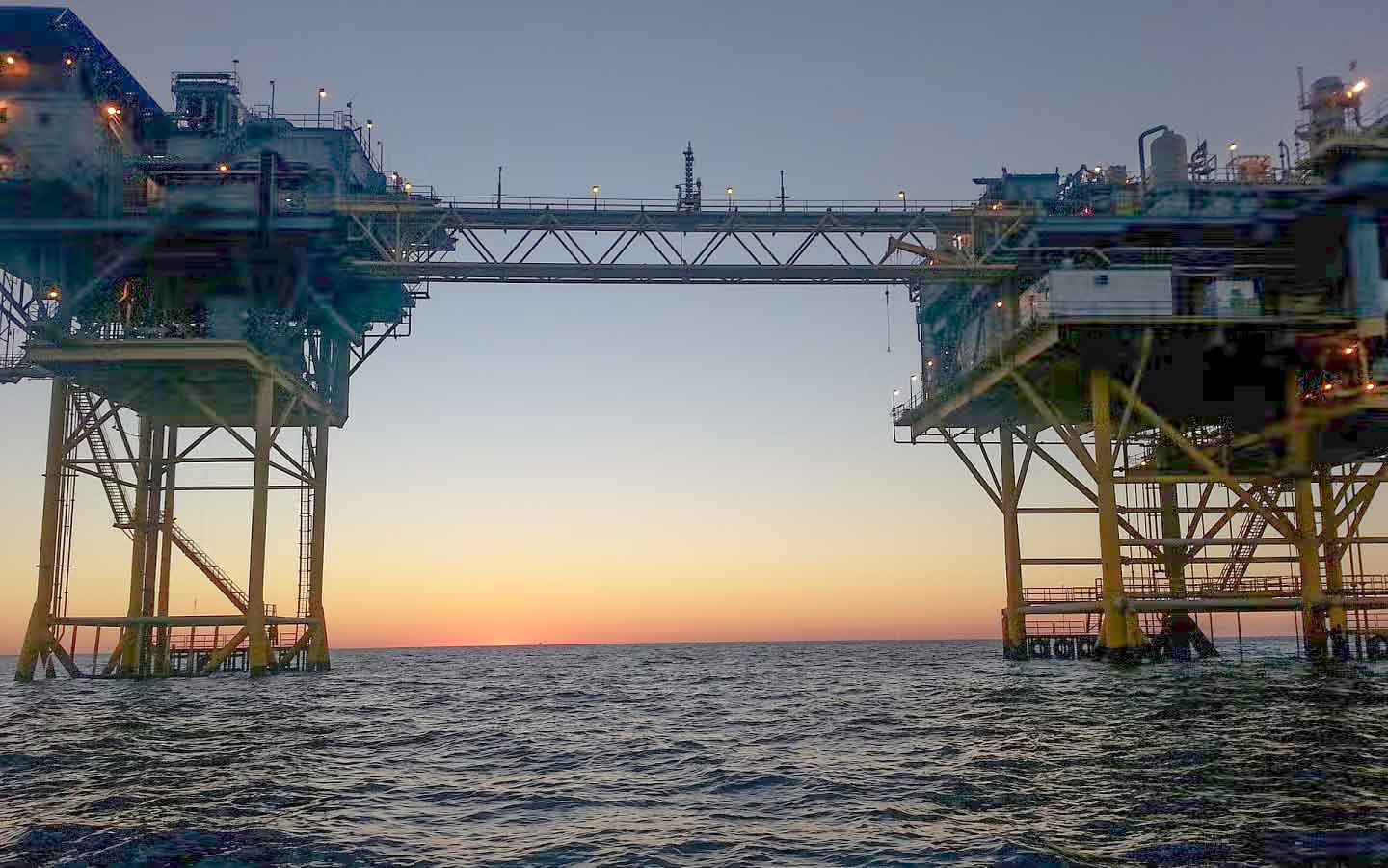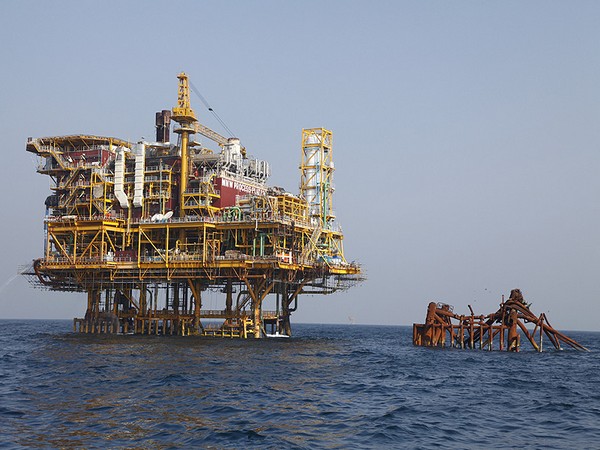TRINIDAD AND TOBAGO | Caught in the Crossfire of US-China-Venezuela Competition

"When the elephants fight, the grass suffers": As China deepens its grip on Venezuelan energy, the twin-island republic faces an impossible choice between survival and sovereignty
MONTEGO BAY, Jamaica, October 17, 2025 - The Dragon gas field sits tantalizingly close to Trinidad and Tobago's shores—just 10 miles across the maritime border in Venezuelan waters. With an estimated 4.2 trillion cubic feet of natural gas, it represents a potential lifeline for the twin-island nation's dying energy sector. But in 2025, accessing this vital resource has become a high-stakes gamble in a game controlled by Washington, Beijing, and Caracas.
For Trinidad and Tobago, the massive Chinese oil platform that arrived in Venezuela's Lake Maracaibo in September wasn't just another geopolitical headline. It was a warning sign that their already precarious position in the region has become even more dangerous.
An Energy Crisis Years in the Making
Trinidad and Tobago's predicament didn't happen overnight. Gas production in the country has been declining for more than a decade, placing intense pressure on the industries that form the backbone of its economy—liquefied natural gas (LNG) and petrochemicals. The twin-island nation, once Latin America's largest LNG exporter, now faces chronic feedstock shortages that threaten its industrial future.
The numbers tell a sobering story. Trinidad's flagship Atlantic LNG facility includes four processing trains capable of producing up to 15 million metric tons per annum. Yet in 2024, the facility managed only 8.2 million metric tons—barely half its capacity. This isn't just an industrial problem; it's an existential threat to an economy built on energy exports.
The solution lies tantalizingly close: Venezuela, which holds the world's eighth-largest natural gas reserves, sits just miles away across the Caribbean Sea. The irony is cruel—Trinidad desperately needs gas while Venezuela, suffocating under US sanctions and mismanagement, cannot monetize its vast reserves.
As Thackwray Driver, head of the Energy Chamber of Trinidad and Tobago, put it bluntly: "We're surrounded by Venezuela, which has huge natural gas resources—some of the biggest in the world—which they have not managed to monetize. So, an obvious route to monetize Venezuela's natural gas resources is through the Trinidad infrastructure."
This geographic reality should make Trinidad and Venezuela natural partners. Instead, it has made Trinidad a hostage to forces far beyond its control.
 Located in Venezuelan territorial waters, the Dragon field is estimated to hold up to 4.2 trillion cubic feet of natural gas.The Dragon Field: So Close, Yet So Far
Located in Venezuelan territorial waters, the Dragon field is estimated to hold up to 4.2 trillion cubic feet of natural gas.The Dragon Field: So Close, Yet So Far

The Dragon field has haunted Trinidad's energy planners for years. Discovered by Venezuela's PDVSA over a decade ago, the field underwent production tests and partial pipeline construction before being abandoned due to lack of partners, investment, and eventually, crushing US sanctions.
Since 2018, Trinidad has been pursuing access to Dragon through a partnership involving Shell, Trinidad's National Gas Company (NGC), and PDVSA. The project would involve a 22-kilometer pipeline connecting the Dragon field to Shell's Hibiscus platform offshore Trinidad, potentially delivering about 185 million cubic feet of gas per day—enough to breathe new life into Trinidad's struggling LNG sector.
But every step forward has been matched by two steps back, as shifting US policy toward Venezuela has made the project a political football. In 2023, the US granted a special license allowing the project to move forward. By April 2025, the Trump administration had revoked that license, forcing Western energy companies—including Shell and BP—to wind down operations by May 27, 2025.
The message was clear: even Trinidad's desperate energy needs came second to Washington's Venezuela policy.
Then, in October 2025, came another reversal. The US Treasury granted a new authorization, structured in three stages and allowing negotiations through April 2026. But this license came with strings attached: mandatory inclusion of US companies in the development and prohibition of direct cash payments to the Maduro government.
Trinidad's Attorney General John Jeremie tried to sound optimistic, noting that "you have to hit commercial targets for U.S. companies. We don't think those targets are hard to meet. They are reasonable." But the underlying reality remained unchanged—Trinidad's energy future depends on licenses that can be revoked at Washington's whim.
Stuart Young, then Trinidad's Minister of Energy, captured the frustration: "This does not come necessarily as a surprise, seeing how volatile things are, not only with respect to the policy with Venezuela, but what we're seeing, for example, with the application of tariffs."
Enter the Dragon—The Chinese One
While Trinidad has spent years navigating US licensing uncertainty, China has been pursuing a fundamentally different strategy in Venezuela: massive, long-term investment with no political strings attached.
The arrival of the Alula oil platform in Lake Maracaibo represents the culmination of China's approach. With over $1 billion invested and a 20-year production-sharing contract, China Concord Resources Corp has secured what Trinidad cannot: stable, predictable access to Venezuelan energy resources.
For Trinidad, the implications are profound. As China deepens its economic and strategic ties with Venezuela, Caracas has less incentive to accommodate Trinidad's needs or Washington's demands. Why struggle to work within US sanctions frameworks when China offers unconditional support?
The numbers underscore China's dominance: approximately 85% of Venezuela's oil exports now go to China. Beijing has become Venezuela's indispensable partner, providing not just markets but investment, technology, and diplomatic cover. Venezuela and China elevated their relationship in 2023 to an "all-weather strategic partnership"—the highest category China reserves for its most important allies.
This shift fundamentally alters the regional power dynamics. Trinidad once envisioned itself as a critical partner for Venezuela, offering the infrastructure and expertise to monetize Venezuelan gas. Now, Venezuela has an alternative patron—one that doesn't threaten sanctions or demand regime change.
Trinidad's recent deepwater oil and gas auction starkly illustrated the new reality. Of 26 blocks offered, only four received bids—three from China's CNOOC and one from a consortium of smaller firms. Western investors are staying away, but China is actively expanding its Caribbean presence.
 The Alula oil platform in Lake Maracaibo represents a culmination of China's approach of making strategic, private investments in Venezuela's oil sector, circumventing U.S. sanctions by leveraging a production-sharing agreement to secure crude oil for its own market.Security Threats Hit Home
The Alula oil platform in Lake Maracaibo represents a culmination of China's approach of making strategic, private investments in Venezuela's oil sector, circumventing U.S. sanctions by leveraging a production-sharing agreement to secure crude oil for its own market.Security Threats Hit Home

The escalating US-Venezuela tensions aren't just geopolitical abstractions for Trinidad—they're literally hitting home with deadly consequences.
In October 2025, the US Embassy in Trinidad and Tobago issued an extraordinary warning, cautioning Americans to stay away from US government facilities due to "a heightened state of alert." Trinidad's Minister of Homeland Security, Roger Alexander, confirmed the alert was based on threats directed at American citizens, which US authorities said "could be linked" to ongoing tensions in the region.
The tensions stem from a controversial Trump administration policy: treating alleged drug traffickers as "unlawful combatants" subject to military strikes. Since early September 2025, US forces have conducted at least six strikes in Caribbean waters, killing at least 28-29 people. Venezuela has denounced the strikes as a "policy of aggression, threats and harassment."
For Trinidad, the consequences have been tragic and personal. In one Trinidadian community, families mourn the disappearance of two local fishermen believed killed in a US strike on October 15. These men weren't geopolitical pawns or abstract casualties—they were Trinidadian citizens, lost in waters just miles from their home, caught in a conflict not of their making.
The security alert mentioned that US officials briefed Trinidadian authorities about the "tense situation in the region." Trinidad has implemented security measures to deal with potential threats, but the fundamental problem remains: the twin-island nation sits at the epicenter of an escalating confrontation between the United States and a Venezuela now backed by China.
The Impossible Balancing Act
Trinidad and Tobago finds itself performing an impossible balancing act. The country must:
Maintain good relations with the United States, which controls access to Venezuelan energy through its sanctions regime and can revoke licenses at any time. Washington has made clear that Trinidad's energy security matters—but not enough to override broader Venezuela policy.
Secure vital energy supplies from Venezuela, whose government is under US sanctions and increasingly aligned with China. Without Venezuelan gas, Trinidad's LNG and petrochemical industries face decline or collapse.
Navigate Chinese influence in its immediate neighborhood without antagonizing either Beijing or Washington. China's dominance in Venezuela means any Trinidad-Venezuela energy deal implicitly benefits Chinese interests in the region.
Protect its citizens from the spillover effects of US-Venezuela confrontation, including military strikes in waters where Trinidadian fishermen operate and potential retaliatory threats linked to US-Venezuela tensions.
The Energy Chamber of Trinidad & Tobago described the situation diplomatically but accurately: "The importation of pipeline gas from Venezuela for processing and onward sales to international markets as either LNG or petrochemicals, remains a significant economic opportunity for Trinidad & Tobago. It is important that the government of Trinidad & Tobago continues to engage actively with both the government of the United States and Venezuela to find a mechanism to pursue this opportunity."
What they didn't say—but everyone knows—is that finding such a mechanism has become nearly impossible in the current environment.
The Price of Proximity
Trinidad's geographic proximity to Venezuela, once seen as an economic advantage, has become a strategic liability in the era of great power competition.
Located just seven miles from Venezuela at the closest point, Trinidad cannot escape the implications of Chinese expansion in Venezuelan energy. When China invests $1 billion in Lake Maracaibo, when Chinese companies secure 20-year production contracts, when 85% of Venezuelan oil flows to China—these developments reshape Trinidad's immediate environment in ways the twin-island nation cannot control.
Prime Minister Keith Rowley had tried to emphasize energy cooperation as a force for regional stability, saying during one Dragon field signing: "Today's deal and the project to jointly produce and sell gas is a message of cooperation, solidarity and shared sovereignty. It is a message of peace for the whole Caribbean."
But that message now rings hollow when US strikes kill Trinidadian fishermen, when embassy warnings tell Americans to avoid government facilities, when licenses get revoked and reinstated on political timelines that ignore Trinidad's economic realities.
An Uncertain Future
As of late 2025, Trinidad continues to push forward with the Dragon project, hoping the latest US license will hold long enough for Shell and NGC to reach a final investment decision and begin construction. Shell has expressed optimism about starting gas production by 2026—a year ahead of the original 2027 timeline—assuming negotiations proceed smoothly and the political stars align.
But assumptions of smooth negotiations and aligned stars seem dangerously optimistic given recent history.
The reality is that Trinidad's energy future depends on factors completely outside its control: Will Washington maintain the current license or reverse course again? Will Venezuela, emboldened by Chinese support, accept terms designed to limit benefits to the Maduro government? Will escalating US-Venezuela tensions make the project politically or physically untenable?
Trinidad has also explored the Loran-Manatee field—another cross-border gas deposit with Venezuela containing an estimated 10 trillion cubic feet of natural gas. But this project faces the same fundamental challenges: US sanctions, Venezuelan cooperation, and the increasingly complex dynamics created by Chinese dominance in Venezuelan energy.
The Bigger Picture
Trinidad and Tobago's predicament illustrates a broader challenge facing small nations in the Caribbean and Latin America. As great powers compete for influence and resources, smaller countries find their sovereignty constrained and their security threatened by forces they cannot control.
For Trinidad, the Chinese oil platform in Lake Maracaibo represents more than just another energy investment. It symbolizes a fundamental shift in regional power dynamics—one that places the twin-island nation in an increasingly precarious position.
The United States wants to isolate and pressure Venezuela, viewing the country as a geopolitical problem to be solved through sanctions and potential military action. China sees Venezuela as an opportunity—a source of energy and a strategic foothold in the Western Hemisphere. Venezuela, for its part, has chosen Beijing's unconditional support over Washington's demands for regime change.
And Trinidad? Trinidad just needs gas to keep its economy alive. The tragedy is that this should be solvable. Venezuela has vast gas reserves it cannot monetize. Trinidad has world-class infrastructure sitting idle for lack of feedstock. A few kilometers of pipeline could connect supply with demand, reviving Trinidad's economy while giving Venezuela a legitimate revenue stream.
Instead, Trinidad watches as Chinese platforms arrive in Venezuelan waters, as US strikes kill its fishermen, as licenses get revoked and tentatively reinstated, as embassy warnings tell Americans to avoid government facilities because of regional tensions the twin-island nation played no role in creating.
As great powers clash in its backyard, Trinidad and Tobago has become a case study in the constraints facing small nations in a world of renewed great power competition. The Dragon field remains tantalizing close—just 10 miles away. But in today's geopolitical environment, those 10 miles might as well be an ocean.
For a nation of just 1.4 million people trying to survive on energy exports, the message is clear: in the new era of US-China competition, proximity to the contested prize doesn't mean you get to benefit from it. Sometimes, it just means you're in the line of fire.
-30-
